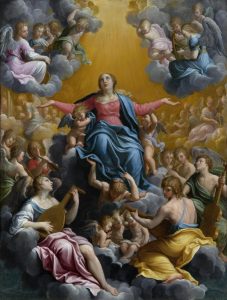HOMILY WEEK 19 04 – Year I
The Assumption of Mary –A Call to Greater Justice
(Rev 11:19, 12:1-6, 10; Ps 45; 1 Cor 15:20-26; Lk 1:39-56)
*****************************************************
The feast of the Assumption we are celebrating today comes to us, not from scripture as such, but from the lived tradition of the Church, the lived word of God.

Dormitian of Mary
The Assumption of the Virgin Mary celebrates her being assumed – taken up body and soul – into heaven at the end of her earthly life. It began as a feast day in the Eastern Church after the Council of Ephesus proclaimed Mary the Mother of God in 431 AD. By the 6thcentury, the feast celebrated Mary’s Dormition, her “falling asleep,” meaning her death; there are several ancient icons of the Dormition. The Western Church began to celebrate this feast around 650 AD. This feast basically means there was no obstacle to deny her passing through death to become the first, after Jesus her Son, to be raised body and soul to the fullness of life with God.
For those who might question placing such emphasis on a non-biblical event, we can rest assured because from the beginning, the church has always balanced the written word of God (scripture) with the lived word of God (Tradition). Actually, for centuries, there was no New Testament bible such as we have today. In fact, the famous dictum of the Protestant Reformation, sola scriptura (scripture alone) is not found in the bible. What is found there is described well in Acts 15:28, where the apostles, facing the question of circumcision for the gentiles, met, prayed, and then stated “It seemed good to us and to the Holy Spirit …”
This is truly the lived word of God – the early church leaders making decisions under the guidance of the Holy Spirit, and thus forming the earliest traditions or practices of the Church. The Roman Catholic Church officially regards tradition and scripture as equal, as interpreted by the Magisterium of the Church as “one common source … with two distinct modes of transmission.”
As an example of this Tradition, Pope Pius XII, after quoting St. John Damascene & St. Germanus of Constantinople, in his Apostolic Constitution on the Assumption of the Blessed Virgin Mary, concludes, “So then, the great Mother of God, so mysteriously united to Jesus Christ from all eternity by the same decree of predestination, immaculately conceived, an intact virgin throughout her divine motherhood, a noble associate of our Redeemer as he defeated sin and its consequences, received, as it were, the final crowning privilege of being preserved from the corruption of the grave and, following her Son in his victory over death, was brought, body and soul, to the highest glory of heaven, to shine as Queen at the right hand of that same Son, the immortal King of Ages.”

Assumption of Mary
Since imitation of Mary is just as important as devotion to her, we can imitate Mary as the first and model disciple in three special ways: her humility, her ability to forgive (at the foot of the Cross she was doing what Jesus was doing on the Cross), and her sense of justice. Her Magnificat, taken from the song of Hannah in the Old Testament, highlights God’s preferential option for the poor throughout our salvation history. The words “God casts down the proud and the mighty; lifts up the poor and lowly; fills the hungry with good things, but sends the rich away empty” caused that hymn to be banned as subversive during the civil war in Guatemala.
We are so fortunate to have a wealth of social justice teachings, which some claim is the best kept secret of the church. Pope Leo XIII in Rerum Novarum,1891, called for improvement of the condition of workers in a time of rapid industrialization and for the rights of working class to just wage. Pope JP II in Laborem Exercens, 1981, advocated for the right to work, unions, a living wage, the right to participate in economic decision-making and the right to strike as a last resort. He taught that human dignity and people are more important than the wants of capital, especially relevant today in the light of tragic injustices such as the plight of the Bangladesh garment industry workers.
The bottom line of all these teachings is a consistent ethic of life; a seamless garment approach to all social issues, not just hot-button ones like anti-abortion, as critical as that is. Catholic schools, parishes and dioceses should ensure that the social teaching of the church is taught and promoted as a rich resource rather than kept as a hidden secret.
Eric was introduced to these social teachings of the Church as a participant in a lay formation program. Surprised and shocked that he had never heard of them before, but energized by these teachings, he actually dared to offer a workshop to the chief and band council of his Indigenous community upon his return.
St. Paul, in the second reading to the Corinthians, adds that those who believe, who belong to Christ, will experience the power of God at work in their lives as new life, as resurrection. The power of God manifests itself especially as forgiveness, healing of our sinfulness, and the courage to work for social justice wherever injustice is found.
Three women of humble faith who imitated Mary can serve as examples: Dorothy Day, founder of the Catholic Worker Movement, practiced a radical activism on behalf of the poor working class; Catherine von de Hueck Doherty, founder of the Marian Worker Movement and Madonna House apostolate, worked on behalf of street people, and St. Mother Theresa of Calcutta saw Jesus in the poor, picked up the dying in Calcutta and gave them death with dignity. Her saying, “What you would want to do for Jesus, whom you cannot see, you can do to the person next to you, whom you can see, and you will be doing it to Jesus,” can inspire us to action. All three had strong Eucharistic faith, a deep prayer life and compassion in serving the poor.
The Eucharist is an act of faith; a humble meal that gives us hope; that makes present God’s love in Christ, and is to be celebrated with joy.
So, on this feast of the Assumption, let us strive to emulate Mary’s humble faith, genuine forgiveness, and joyful compassion for greater justice in our world.




What a beautiful and lovely homily and messages related to the Assumption of Mary. We are to take Mary and God’s example to be humble by experiencing genuine forgiveness, love and compassion. We should be like Virgin Mary as a role model to have humble faith and disciple to forgive people who have hurt us. She has the compassion and love to forgive us for sins. She will give us hope and love so we can carry our lives towards the kingdom of God. Amen . Many Blessings!
Thanks Bishop Sylvain Lavoie for the lovely messages and reflections about the Virgin Mary. It is a blessing to closer to Mary and God so they can protect us always . It is heart warming and joyful. ❤️????✝????❤️???☮